作文:读《医生与病人》有感
如何解决医生与病人之间的关系英语作文

如何解决医生与病人之间的关系英语作文全文共3篇示例,供读者参考篇1How to Improve Doctor-Patient RelationshipThe doctor-patient relationship is a crucial component of healthcare, with communication and trust forming the foundations of this partnership. However, maintaining a positive relationship between doctors and patients can be challenging at times due to various factors such as time constraints, miscommunication, and differing expectations. In this essay, we will discuss some strategies to enhance communication and build trust between doctors and patients to promote a more effective and harmonious relationship.First and foremost, effective communication is essential in fostering a good doctor-patient relationship. Doctors should strive to listen attentively to their patients, show empathy and understanding, and explain medical information in a clear and easily understandable manner. Patients, on the other hand, should feel empowered to ask questions, express their concerns, and actively participate in decision-making regarding theirhealthcare. Open and honest communication can help build trust and mutual respect between doctors and patients.Secondly, respect for patients' autonomy and dignity is crucial in promoting a positive doctor-patient relationship. Doctors should always involve patients in the decision-making process and respect their preferences, values, and beliefs. It is important to recognize that patients have the right to make informed choices about their healthcare and to be treated with dignity and respect at all times.Furthermore, empathy and compassion are key elements in building trust and rapport between doctors and patients. Patients often feel vulnerable and anxious when dealing with health issues, and a caring and empathetic attitude from their doctors can make a significant difference in their experience. Doctors should show kindness, understanding, and emotional support to their patients, which can help alleviate their fears and anxieties.In addition, addressing issues of power imbalance and inequality in the doctor-patient relationship is essential. Doctors should strive to create a collaborative partnership with their patients, where both parties have equal input and are valued for their knowledge and expertise. Patients should feel empoweredto voice their opinions, concerns, and preferences without fear of judgment or dismissal.Moreover, fostering a culture of patient-centered care is essential in improving the doctor-patient relationship. Healthcare systems should prioritize patient needs and preferences, provide timely and accessible care, and ensure that patients are actively involved in their care plans. This can help create a more patient-centered and collaborative approach to healthcare delivery, leading to better health outcomes and increased patient satisfaction.In conclusion, building a positive and effectivedoctor-patient relationship requires effort and commitment from both parties. By promoting open and honest communication, respecting patient autonomy and dignity, showing empathy and compassion, addressing power imbalances, and fostering a culture of patient-centered care, doctors and patients can work together to promote better health outcomes and a more satisfying healthcare experience. Ultimately, a strong doctor-patient relationship is essential for delivering high-quality and patient-centered care.篇2How to Improve the Relationship between Doctors and PatientsIntroductionThe relationship between doctors and patients is crucial for providing quality healthcare. A positive relationship can improve patient outcomes, increase patient satisfaction, and enhance the overall healthcare experience. However, conflicts and misunderstandings between doctors and patients can hinder effective communication and lead to dissatisfaction on both sides. In this essay, we will discuss some ways to improve the relationship between doctors and patients.1. Effective CommunicationCommunication is key in any relationship, including the one between doctors and patients. Doctors should communicate clearly and openly with their patients, explaining diagnoses, treatment options, and potential outcomes in a way that is easy for patients to understand. Patients, on the other hand, should feel comfortable asking questions and expressing their concerns to their doctors. Open and honest communication can help build trust and create a strong doctor-patient relationship.2. Respect and EmpathyDoctors should treat their patients with respect and empathy, acknowledging their fears, concerns, and preferences. Patients are often vulnerable and anxious when seeking medical treatment, and a compassionate doctor can help alleviate these feelings. Likewise, patients should also show respect and appreciation for their doctor's expertise and efforts. Mutual respect and empathy can foster a positive relationship between doctors and patients.3. Shared Decision MakingInvolving patients in decision-making about their treatment can improve their engagement and satisfaction with their healthcare. Doctors should discuss treatment options with their patients, explain the risks and benefits of each option, and consider the patient's preferences and values when making decisions. Patients should also take an active role in their healthcare, voicing their opinions and concerns to their doctors. Shared decision-making can lead to better outcomes and strengthen the doctor-patient relationship.4. Trust and CredibilityTrust is the foundation of any relationship, including the one between doctors and patients. Doctors should be honest, reliable, and competent in their work to earn the trust of theirpatients. Patients, in turn, should trust their doctors' expertise and recommendations. Building trust takes time and effort, but it is essential for a positive doctor-patient relationship. Credibility can be enhanced through good communication, respect, and shared decision-making.5. Patient EducationEducating patients about their health conditions, treatment options, and self-care practices can empower them to take control of their health and improve their outcomes. Doctors should provide patients with clear and accurate information, answer their questions, and encourage them to be proactive in managing their health. Patients, on the other hand, should be proactive in seeking information, asking questions, and following their doctors' recommendations. Patient education can enhance the doctor-patient relationship and lead to better health outcomes.ConclusionImproving the relationship between doctors and patients is essential for providing quality healthcare and promoting positive patient outcomes. Effective communication, respect, empathy, shared decision-making, trust, credibility, and patient education are key factors in building a strong doctor-patient relationship.By fostering a collaborative and respectful partnership, doctors and patients can work together to achieve improved health and well-being.篇3How to Improve Doctor-Patient RelationshipsIntroductionThe doctor-patient relationship is a crucial aspect of healthcare, as it can greatly influence the quality of care provided and patient outcomes. In recent years, there has been an increasing recognition of the importance of fostering positive doctor-patient relationships. In this essay, we will discuss the key factors that contribute to a strong doctor-patient relationship and provide practical strategies for improving these relationships.Factors influencing the doctor-patient relationshipSeveral factors can influence the quality of thedoctor-patient relationship, including communication skills, empathy, trust, cultural competence, and shareddecision-making. Effective communication is essential for building trust and understanding between doctors and patients. Empathy, the ability to understand and share the feelings ofanother person, is also crucial for establishing a meaningful connection with patients. Cultural competence ensures that doctors can effectively communicate with patients from diverse backgrounds and understand their unique perspectives and needs. Shared decision-making involves collaborating with patients to develop treatment plans that take into account their preferences and concerns.Strategies for improving doctor-patient relationshipsThere are several strategies that doctors can employ to enhance their relationships with patients. Firstly, doctors should prioritize building trust with their patients by being honest, transparent, and reliable. They should also strive to develop strong communication skills, such as active listening, asking open-ended questions, and providing clear explanations in plain language. Additionally, doctors should demonstrate empathy and compassion towards their patients by showing understanding and support for their emotions and concerns. Cultural competence can be achieved by seeking to understand and respect the cultural beliefs, values, and practices of patients from different backgrounds. Finally, shared decision-making involves engaging patients in discussions about their treatmentoptions, listening to their input, and working together to develop a plan that meets their needs and preferences.Benefits of a strong doctor-patient relationshipA strong doctor-patient relationship can lead to numerous benefits for both doctors and patients. For doctors, a positive relationship with patients can increase job satisfaction, improve patient outcomes, and reduce the risk of burnout. Patients who have a good relationship with their doctors are more likely to adhere to treatment plans, experience better health outcomes, and have higher levels of satisfaction with their care. In addition, strong doctor-patient relationships can enhance communication, mutual respect, and trust, which are essential for providing high-quality, patient-centered care.ConclusionIn conclusion, the doctor-patient relationship is a fundamental aspect of healthcare that can greatly impact the quality of care provided and patient outcomes. By focusing on factors such as communication skills, empathy, trust, cultural competence, and shared decision-making, doctors can improve their relationships with patients and enhance the quality of care they deliver. Building strong doctor-patient relationships can lead to numerous benefits for both doctors and patients,including improved job satisfaction, better health outcomes, and increased patient satisfaction. Ultimately, fostering positive doctor-patient relationships is essential for providinghigh-quality, patient-centered care.。
红处方读后感1000字红处方读后感

红处方读后感1000字红处方读后感《红处方》是一部让人深思的小说,通过描写医生和患者之间的情感纠葛,展现了医疗行业的现状和人性的复杂性。
读完这本书,我深受感动,也有了许多思考。
小说中的主人公是一位医生,他在医院工作多年,对患者们的痛苦和困境感同身受。
他不仅关心他们的身体健康,更关心他们的心灵健康。
他用自己的爱心和耐心去对待每一个患者,让他们感受到了温暖和关怀。
但是在医院这个特殊的环境里,医生们也面临着各种各样的压力和挑战。
他们需要在繁忙的工作中保持冷静和专业,需要面对各种各样的人际关系和矛盾。
小说中的医生们不仅要处理复杂的病情,还要应对家庭和工作的矛盾,他们的内心世界充满了挣扎和矛盾。
在《红处方》中,作者还描写了一些患者的故事,他们来自不同的家庭和背景,却都面临着病痛的折磨。
有的患者因为家庭的贫困而无法得到及时的治疗,有的患者因为医疗资源的不足而无法得到有效的治疗,有的患者因为医疗纠纷而陷入了绝望。
这些故事让人感到心痛和无力,也让人对医疗行业的现状产生了深深的思考。
读完《红处方》,我对医疗行业有了更深刻的理解。
医生是一群伟大的人,他们不仅需要具备专业的医疗知识和技能,还需要有高尚的医德和人文关怀。
他们需要在工作中保持冷静和专业,需要在人际关系中保持善良和坦诚,需要在生活中保持乐观和坚强。
医生的工作是辛苦的,他们需要面对各种各样的挑战和困难,但是他们的工作是有意义的,因为他们能够给患者带来健康和希望。
在读完《红处方》之后,我也对医患关系有了更多的思考。
医患关系是一个复杂的问题,它涉及到医生和患者之间的信任和尊重,也涉及到医疗资源的分配和利益的平衡。
在现实生活中,医患关系常常会出现矛盾和纠纷,这不仅给医生带来了困扰,也给患者带来了伤害。
我希望医生和患者之间能够建立更多的沟通和理解,相互尊重和信任,共同维护医患关系的和谐和稳定。
总的来说,读完《红处方》让我受益匪浅。
这部小说不仅让我感受到了医生们的辛苦和伟大,也让我对医疗行业和医患关系有了更多的思考。
《医生与病人》读后感
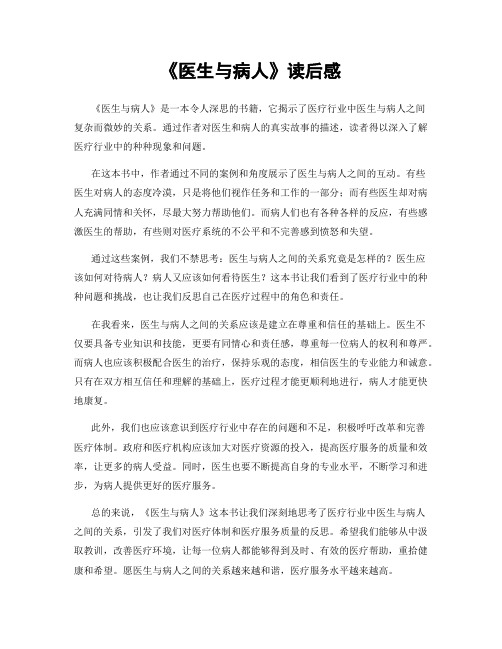
《医生与病人》读后感《医生与病人》是一本令人深思的书籍,它揭示了医疗行业中医生与病人之间复杂而微妙的关系。
通过作者对医生和病人的真实故事的描述,读者得以深入了解医疗行业中的种种现象和问题。
在这本书中,作者通过不同的案例和角度展示了医生与病人之间的互动。
有些医生对病人的态度冷漠,只是将他们视作任务和工作的一部分;而有些医生却对病人充满同情和关怀,尽最大努力帮助他们。
而病人们也有各种各样的反应,有些感激医生的帮助,有些则对医疗系统的不公平和不完善感到愤怒和失望。
通过这些案例,我们不禁思考:医生与病人之间的关系究竟是怎样的?医生应该如何对待病人?病人又应该如何看待医生?这本书让我们看到了医疗行业中的种种问题和挑战,也让我们反思自己在医疗过程中的角色和责任。
在我看来,医生与病人之间的关系应该是建立在尊重和信任的基础上。
医生不仅要具备专业知识和技能,更要有同情心和责任感,尊重每一位病人的权利和尊严。
而病人也应该积极配合医生的治疗,保持乐观的态度,相信医生的专业能力和诚意。
只有在双方相互信任和理解的基础上,医疗过程才能更顺利地进行,病人才能更快地康复。
此外,我们也应该意识到医疗行业中存在的问题和不足,积极呼吁改革和完善医疗体制。
政府和医疗机构应该加大对医疗资源的投入,提高医疗服务的质量和效率,让更多的病人受益。
同时,医生也要不断提高自身的专业水平,不断学习和进步,为病人提供更好的医疗服务。
总的来说,《医生与病人》这本书让我们深刻地思考了医疗行业中医生与病人之间的关系,引发了我们对医疗体制和医疗服务质量的反思。
希望我们能够从中汲取教训,改善医疗环境,让每一位病人都能够得到及时、有效的医疗帮助,重拾健康和希望。
愿医生与病人之间的关系越来越和谐,医疗服务水平越来越高。
病人与医生的关系作文
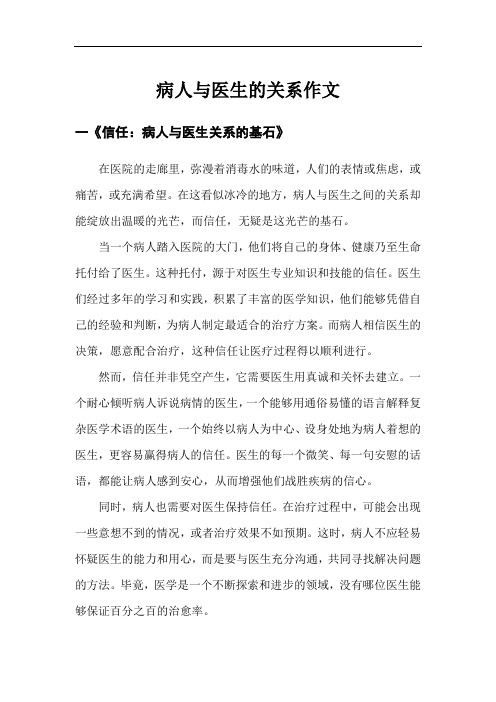
病人与医生的关系作文一《信任:病人与医生关系的基石》在医院的走廊里,弥漫着消毒水的味道,人们的表情或焦虑,或痛苦,或充满希望。
在这看似冰冷的地方,病人与医生之间的关系却能绽放出温暖的光芒,而信任,无疑是这光芒的基石。
当一个病人踏入医院的大门,他们将自己的身体、健康乃至生命托付给了医生。
这种托付,源于对医生专业知识和技能的信任。
医生们经过多年的学习和实践,积累了丰富的医学知识,他们能够凭借自己的经验和判断,为病人制定最适合的治疗方案。
而病人相信医生的决策,愿意配合治疗,这种信任让医疗过程得以顺利进行。
然而,信任并非凭空产生,它需要医生用真诚和关怀去建立。
一个耐心倾听病人诉说病情的医生,一个能够用通俗易懂的语言解释复杂医学术语的医生,一个始终以病人为中心、设身处地为病人着想的医生,更容易赢得病人的信任。
医生的每一个微笑、每一句安慰的话语,都能让病人感到安心,从而增强他们战胜疾病的信心。
同时,病人也需要对医生保持信任。
在治疗过程中,可能会出现一些意想不到的情况,或者治疗效果不如预期。
这时,病人不应轻易怀疑医生的能力和用心,而是要与医生充分沟通,共同寻找解决问题的方法。
毕竟,医学是一个不断探索和进步的领域,没有哪位医生能够保证百分之百的治愈率。
当病人与医生之间建立了深厚的信任关系,奇迹往往会发生。
那些被认为无法治愈的疾病,可能会因为病人积极的心态和医生不懈的努力而出现转机;那些原本紧张的医患关系,也会因为信任而变得和谐融洽。
信任,是病人与医生携手战胜病魔的力量源泉,是构建良好医患关系的基石。
让我们珍惜这份信任,共同为健康而努力。
二《理解与包容:病人与医生关系的润滑剂》在医疗的舞台上,病人与医生是两个不可或缺的角色。
他们共同演绎着与疾病抗争的故事,而理解与包容则如同润滑剂,使这段关系更加和谐、顺畅。
病人,往往处于身体和心理的双重困境中。
疾病带来的痛苦、对未知的恐惧以及生活的不便,让他们渴望得到医生的关怀和帮助。
医生和病人作文英语
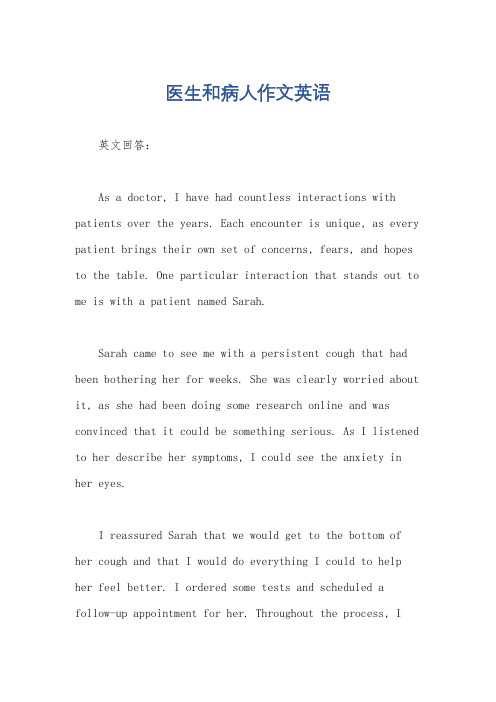
医生和病人作文英语英文回答:As a doctor, I have had countless interactions with patients over the years. Each encounter is unique, as every patient brings their own set of concerns, fears, and hopes to the table. One particular interaction that stands out to me is with a patient named Sarah.Sarah came to see me with a persistent cough that had been bothering her for weeks. She was clearly worried about it, as she had been doing some research online and was convinced that it could be something serious. As I listened to her describe her symptoms, I could see the anxiety in her eyes.I reassured Sarah that we would get to the bottom of her cough and that I would do everything I could to help her feel better. I ordered some tests and scheduled afollow-up appointment for her. Throughout the process, Imade sure to keep her informed and answer any questions she had.At the follow-up appointment, I was able to give Sarah some good news – her cough was simply due to a mild respiratory infection that would clear up with some rest and medication. The relief on her face was palpable, and she thanked me profusely for putting her mind at ease.This interaction with Sarah reminded me of the importance of not only treating the physical symptoms of a patient, but also addressing their emotional needs. Sometimes, a kind word or a listening ear can make all the difference in a patient's journey to recovery.中文回答:作为一名医生,我多年来与患者交流无数。
怎样处理医生与病人的关系英语作文

怎样处理医生与病人的关系英语作文英文回答:The doctor-patient relationship is a complex one, involving a unique blend of trust, vulnerability, and power dynamics. It is essential for both parties to understand the nature of this relationship in order to ensure optimal health outcomes and patient satisfaction.Trust is a cornerstone of the doctor-patient relationship. Patients need to trust that their doctors are competent, caring, and acting in their best interests. Doctors, in turn, need to earn this trust by being honest, transparent, and respectful of their patients' autonomy.Vulnerability is another key aspect of the doctor-patient relationship. Patients often share highly personal information with their doctors, and they need to feel safe and comfortable doing so. Doctors have a responsibility to maintain patient confidentiality and to treat patients withdignity and respect.Power dynamics are inherent in the doctor-patient relationship. Doctors have a certain degree of power over their patients, by virtue of their medical knowledge and expertise. It is important for doctors to use this power responsibly and to always act in the best interests of their patients.The doctor-patient relationship is a dynamic one, and it is constantly evolving. As patients' needs change over time, so too must the relationship between them and their doctors. It is important for both parties to be open to communication and to work together to build a strong and trusting relationship.中文回答:医生与病人的关系。
医生与患者发生的一个温暖的故事作文
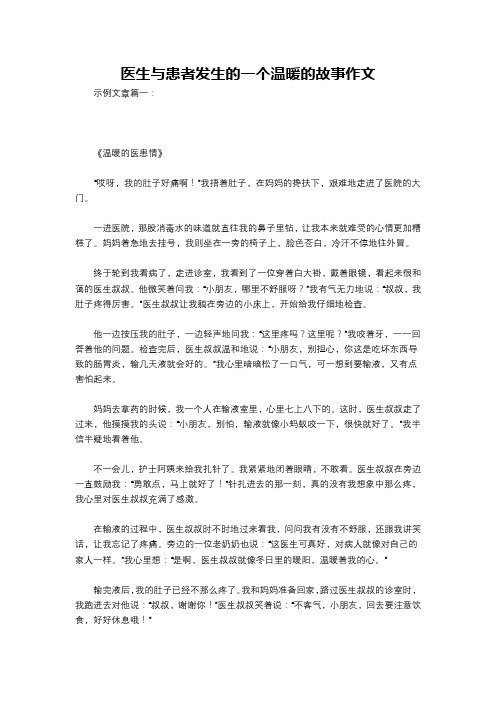
医生与患者发生的一个温暖的故事作文示例文章篇一:《温暖的医患情》“哎呀,我的肚子好痛啊!”我捂着肚子,在妈妈的搀扶下,艰难地走进了医院的大门。
一进医院,那股消毒水的味道就直往我的鼻子里钻,让我本来就难受的心情更加糟糕了。
妈妈着急地去挂号,我则坐在一旁的椅子上,脸色苍白,冷汗不停地往外冒。
终于轮到我看病了,走进诊室,我看到了一位穿着白大褂,戴着眼镜,看起来很和蔼的医生叔叔。
他微笑着问我:“小朋友,哪里不舒服呀?”我有气无力地说:“叔叔,我肚子疼得厉害。
”医生叔叔让我躺在旁边的小床上,开始给我仔细地检查。
他一边按压我的肚子,一边轻声地问我:“这里疼吗?这里呢?”我咬着牙,一一回答着他的问题。
检查完后,医生叔叔温和地说:“小朋友,别担心,你这是吃坏东西导致的肠胃炎,输几天液就会好的。
”我心里暗暗松了一口气,可一想到要输液,又有点害怕起来。
妈妈去拿药的时候,我一个人在输液室里,心里七上八下的。
这时,医生叔叔走了过来,他摸摸我的头说:“小朋友,别怕,输液就像小蚂蚁咬一下,很快就好了。
”我半信半疑地看着他。
不一会儿,护士阿姨来给我扎针了。
我紧紧地闭着眼睛,不敢看。
医生叔叔在旁边一直鼓励我:“勇敢点,马上就好了!”针扎进去的那一刻,真的没有我想象中那么疼,我心里对医生叔叔充满了感激。
在输液的过程中,医生叔叔时不时地过来看我,问问我有没有不舒服,还跟我讲笑话,让我忘记了疼痛。
旁边的一位老奶奶也说:“这医生可真好,对病人就像对自己的家人一样。
”我心里想:“是啊,医生叔叔就像冬日里的暖阳,温暖着我的心。
”输完液后,我的肚子已经不那么疼了。
我和妈妈准备回家,路过医生叔叔的诊室时,我跑进去对他说:“叔叔,谢谢你!”医生叔叔笑着说:“不客气,小朋友,回去要注意饮食,好好休息哦!”这就是我和医生叔叔之间发生的温暖的故事。
在我生病难受的时候,是他用耐心和关爱,让我不再害怕,让我感受到了温暖。
难道这样的好医生不值得我们尊敬和赞美吗?我想,以后我也要像他一样,做一个能给别人带来温暖和帮助的人!示例文章篇二:《温暖的医患情》“哎呀,我的肚子好痛啊!”我捂着肚子,痛苦地呻吟着。
怎样处理医生与病人的关系英语作文
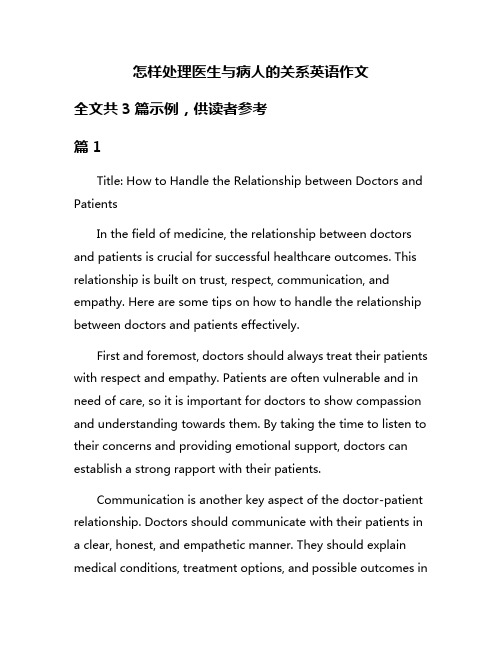
怎样处理医生与病人的关系英语作文全文共3篇示例,供读者参考篇1Title: How to Handle the Relationship between Doctors and PatientsIn the field of medicine, the relationship between doctors and patients is crucial for successful healthcare outcomes. This relationship is built on trust, respect, communication, and empathy. Here are some tips on how to handle the relationship between doctors and patients effectively.First and foremost, doctors should always treat their patients with respect and empathy. Patients are often vulnerable and in need of care, so it is important for doctors to show compassion and understanding towards them. By taking the time to listen to their concerns and providing emotional support, doctors can establish a strong rapport with their patients.Communication is another key aspect of the doctor-patient relationship. Doctors should communicate with their patients in a clear, honest, and empathetic manner. They should explain medical conditions, treatment options, and possible outcomes ina way that is easy for patients to understand. By keeping patients informed and involved in their healthcare decisions, doctors can empower them to take control of their own health.Trust is essential in the doctor-patient relationship. Patients need to trust that their doctor has their best interests at heart and is providing them with the best possible care. Doctors, on the other hand, need to trust that their patients will follow their advice and treatment plans. Building trust takes time and effort, but it is essential for a successful doctor-patient relationship.In addition, doctors should always be honest with their patients. It is important to give patients accurate information about their condition, prognosis, and treatment options, even if it is difficult news to deliver. Patients have the right to know what is happening with their health, and dishonesty can erode the trust between doctors and patients.Respecting patients' autonomy is also important in the doctor-patient relationship. Patients should have the right to make informed decisions about their healthcare, including treatment options, medication choices, and end-of-life care. Doctors should provide patients with the information they need to make these decisions and respect the choices they make.Finally, doctors should always strive to provide the highest quality of care for their patients. This includes staying up-to-date on the latest medical advancements, following evidence-based guidelines, and continuously improving their medical skills. By providing excellent care, doctors can reassure their patients that they are in good hands and build a strong foundation for a positive doctor-patient relationship.In conclusion, the relationship between doctors and patients plays a crucial role in healthcare outcomes. By treating patients with respect, communicating effectively, building trust, being honest, respecting autonomy, and providing high-quality care, doctors can establish strong, positive relationships with their patients. These relationships not only improve patient satisfaction and outcomes but also contribute to a more fulfilling and rewarding practice for doctors.篇2How to Handle the Relationship Between Doctors and PatientsIntroductionThe relationship between doctors and patients is an essential aspect of healthcare. A good doctor-patient relationship can notonly promote effective communication and trust but also improve treatment outcomes. However, misunderstandings, conflicts, and lack of communication often arise in this relationship. Therefore, it is crucial for both doctors and patients to understand how to handle and maintain a healthydoctor-patient relationship.CommunicationEffective communication is the key to a successfuldoctor-patient relationship. Doctors should listen carefully to patients' concerns and complaints, ask relevant questions, and provide clear and concise explanations about their conditions and treatment plans. On the other hand, patients should also communicate openly and honestly with their doctors, share their symptoms, medical history, and lifestyle habits, and ask questions to clarify any doubts or concerns.TrustTrust is another vital element in the doctor-patient relationship. Patients should trust their doctors' expertise and judgment, follow their advice, and adhere to the prescribed treatment plans. Meanwhile, doctors should build trust by demonstrating competence, compassion, and respect for theirpatients. By establishing trust, doctors and patients can work together as a team to achieve the best treatment outcomes.RespectRespect is essential for maintaining a positive doctor-patient relationship. Doctors should treat patients with empathy, dignity, and respect, regardless of their backgrounds or conditions. Likewise, patients should also show respect for their doctors by valuing their expertise, following their instructions, and recognizing their efforts to provide quality care. Mutual respect fosters a collaborative and harmonious relationship between doctors and patients.EmpathyEmpathy plays a significant role in the doctor-patient relationship. Doctors should try to understand patients' emotions, fears, and concerns, and provide emotional support along with medical treatment. Patients, on the other hand, should also empathize with their doctors' workload, challenges, and responsibilities, and appreciate their dedication to providing care. By showing empathy towards each other, doctors and patients can develop a strong bond and connection that enhances the healing process.ProfessionalismProfessionalism is crucial for maintaining a healthydoctor-patient relationship. Doctors should adhere to ethical standards, maintain confidentiality, and act in the best interest of their patients. Patients should also cooperate with their doctors, follow medical advice, and respect their decisions. By upholding professionalism, doctors and patients can build a relationship based on integrity, trust, and mutual respect.Conflict ResolutionConflicts and disagreements may arise in the doctor-patient relationship due to miscommunication, misunderstandings, or differences in expectations. Both doctors and patients should approach conflicts with a calm and rational mindset, listen to each other's perspectives, and work towards finding a resolution that meets the needs of both parties. Effective conflict resolution can strengthen the doctor-patient relationship and prevent further misunderstandings in the future.ConclusionIn conclusion, handling the relationship between doctors and patients requires effective communication, trust, respect, empathy, professionalism, and conflict resolution skills. Bynurturing a positive and collaborative relationship, doctors and patients can work together towards achieving the best possible outcomes in healthcare. It is essential for both parties to prioritize the well-being and interests of the patient and strive to maintain a harmonious and productive relationship. Ultimately, a healthy doctor-patient relationship benefits not only the individuals involved but also the overall quality of healthcare delivery.篇3How to Handle the Relationship between Doctors and PatientsIntroductionThe relationship between doctors and patients is crucial for the successful treatment and care of patients. A positive and trusting relationship can not only enhance the effectiveness of medical treatment but also improve patients' psychological well-being. In this essay, I will discuss the importance of building a good relationship between doctors and patients and provide suggestions on how to handle this relationship effectively.Importance of Building a Good RelationshipA good relationship between doctors and patients is essential for effective communication, mutual trust, and cooperation. When patients feel comfortable and respected in their interactions with doctors, they are more likely to share their concerns, symptoms, and medical history openly. This, in turn, allows doctors to make accurate diagnoses and develop appropriate treatment plans. Furthermore, a positivedoctor-patient relationship can also improve patients' adherence to treatment regimens, leading to better health outcomes.Tips for Handling the Relationship1. Communicate effectively: Good communication is the foundation of a successful doctor-patient relationship. Doctors should listen attentively to patients, explain medical information clearly in a language that patients can understand, and encourage patients to ask questions. Patients, on the other hand, should be open and honest about their symptoms, concerns, and expectations.2. Show empathy and compassion: Patients often feel vulnerable and anxious about their health, so it is important for doctors to show empathy and compassion towards them. Empathy can help doctors understand patients' emotions andconcerns, while compassion can make patients feel cared for and supported.3. Respect patients' autonomy: Patients have the right to make informed decisions about their own health care. Doctors should respect patients' autonomy by involving them in decision-making processes, discussing treatment options, and seeking their consent before proceeding with any medical procedure.4. Build trust: Trust is the cornerstone of a strongdoctor-patient relationship. Doctors should build trust by being honest, dependable, and transparent in their interactions with patients. Patients, in turn, should trust doctors' expertise and follow their recommendations.5. Address conflicts and misunderstandings: Conflicts and misunderstandings can arise in any relationship, including the doctor-patient relationship. It is important to address these issues promptly and constructively. Doctors should listen to patients' concerns, acknowledge any mistakes or miscommunications, and work together to resolve conflicts.ConclusionIn conclusion, handling the relationship between doctors and patients with care, respect, and empathy is essential for providing high-quality medical care and ensuring positive health outcomes. By following the tips mentioned above, both doctors and patients can contribute to building a strong and collaborative relationship that benefits everyone involved. Ultimately, a good doctor-patient relationship is not only beneficial for individual patients but also for the healthcare system as a whole.。
医生和病人作文英语
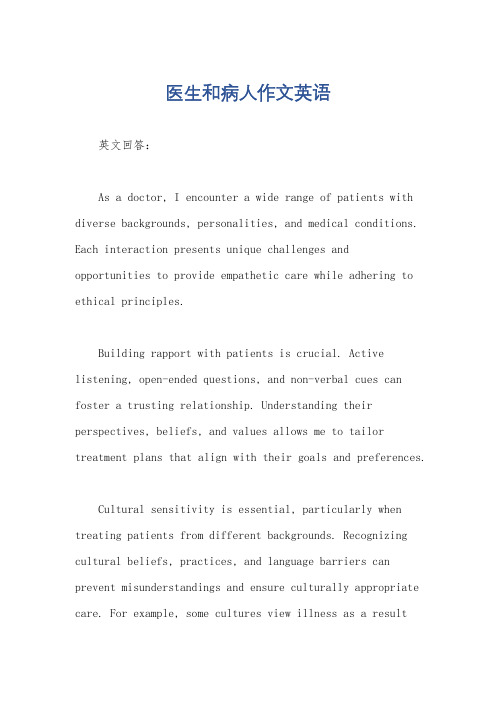
医生和病人作文英语英文回答:As a doctor, I encounter a wide range of patients with diverse backgrounds, personalities, and medical conditions. Each interaction presents unique challenges andopportunities to provide empathetic care while adhering to ethical principles.Building rapport with patients is crucial. Active listening, open-ended questions, and non-verbal cues can foster a trusting relationship. Understanding their perspectives, beliefs, and values allows me to tailor treatment plans that align with their goals and preferences.Cultural sensitivity is essential, particularly when treating patients from different backgrounds. Recognizing cultural beliefs, practices, and language barriers can prevent misunderstandings and ensure culturally appropriate care. For example, some cultures view illness as a resultof supernatural causes, while others emphasize prevention and holistic approaches.Confidentiality and privacy are paramount in medical ethics. Maintaining patient confidentiality helps build trust and protects their sensitive information. I adhere to strict patient privacy laws and use secure electronic health records to safeguard their data.Professional boundaries are crucial to maintain a therapeutic relationship. While empathy is essential, it's important to avoid overstepping professional boundaries. Establishing clear limits and respecting patient autonomy allows for appropriate interactions without compromising their safety or well-being.End-of-life care presents ethical considerations that require sensitivity and compassion. Balancing patient autonomy with their best interests is paramount. Respecting their wishes while providing comfort and support is essential.Dealing with difficult patients can be challenging. Maintaining professionalism, empathy, and clear communication are key. Active listening, acknowledging their concerns, and exploring alternative solutions can help resolve conflicts amicably.Finally, reflecting on my practice is crucial for continuous improvement. Regular self-assessments, peer reviews, and continuing medical education ensure that I stay up-to-date with medical advancements and provide the highest quality of care to my patients.中文回答:作为一名医生,我接触到来自不同背景、性格和身体状况的各种各样的病人。
如何处理好医生与病人之间的关系英语作文

如何处理好医生与病人之间的关系英语作文全文共6篇示例,供读者参考篇1How to Be a Good Doctor and PatientHi there! My name is Jamie and I'm going to tell you all about how doctors and patients should act. It's really important that they get along well. If they don't, the patient might not get better!Being a good doctor is hard work. First of all, you have to go to school for a super long time to learn everything there is to know about the human body and different sicknesses. Can you imagine studying for 8 years after high school? That's crazy! But doctors have to do that so they really understand how our bodies work.After all that school, doctors have to be really smart and know a lot of big medical words that us regular people don't understand. But that's okay, because part of being a good doctor is explaining things in a simpler way that patients can get. Using small words and drawing pictures is a great idea so the patient isn't confused.Doctors also have to be really good listeners. They can't just start treating someone before they know what's wrong! Asking lots of questions about symptoms and letting the patient describe how they feel is important. Doctors shouldn't interrupt or act annoyed if the patient rambles on a bit. Being patient and caring is better.Something else that makes a good doctor is being gentle. Nobody likes getting shots or having the doctor look at aboo-boo and poke at it. Doctors have to have a soft touch and not be too rough, especially with little kids who might get scared easily. Using kid-friendly words and maybe cracking a joke can make them feel less afraid too.Another important thing is being a good observer. Doctors have to closely watch their patients to see if they are getting better or worse. They need to notice even little changes that could be signs of something more serious. Using all their senses like watching, listening, and even smelling for odd odors can help them figure out what is wrong.The best doctors also double check everything to avoid mistakes. They carefully read test results, ask follow-up questions, and consider all possibilities before deciding on a diagnosis and treatment. Being careless and rushing could mean the patientdoesn't get the right medicine and doesn't get better. Taking time and being thorough is crucial.Finally, a compassionate doctor makes a huge difference. They need to treat every patient with kindness, making them feel comforted instead of scared. Using a warm tone, making eye contact, giving encouragement, and showing genuine concern all helps the patient relax and trust the doctor's advice.Okay, now let's talk about how to be a good patient too! This is also really important for helping doctors do their job properly. First off, patients need to be honest and upfront about any health issues, even if they feel embarrassed or afraid. Leaving out details or fudging the truth can confuse the doctor and make it harder to help.Patients should also follow the doctor's instructions exactly, like taking all the medicine as prescribed and doing any exercises or treatments they recommend. If you have a question, ask! Don't just ignore the directions because you don't understand. The doctor wants to explain so you can get better.Speaking of asking questions, it's a really good idea for patients to do that if anything is unclear. There's no such thing as a dumb question when it comes to your health! Writing downnotes or having someone come to appointments to help remember everything the doctor says can also be useful.Another way to be a great patient is by being open-minded and not arguing with the doctor's expertise and advice. They went to school for a really long time to learn this stuff, so it's best to put your trust in them unless you have a really strong reason to disagree. Doctors are the professionals who know what's best.Being patient is also important when you're a patient! Sometimes test results take a while or you have to wait a long time in rooms or lobbies. Getting impatient and grumpy won't make things go faster. Stay calm and bring something to keep you busy, like a book or game on your phone.Last but not least, probably the most important thing for patients is to have a positive attitude! Having an illness or injury can be really hard, but staying upbeat and following your treatment plan is crucial for actually getting better. Don't let yourself get too discouraged or give up. Cheer yourself on and celebrate small victories!Well, there you have it - all the best tips for being a fantastic doctor and patient. It's not always easy, but working together with kindness, honesty and open communication is the best wayto make sure everyone gets healthy. I'd give both my doctors and my parents an A+ for how well they follow this advice!篇2How to Be a Good Doctor and PatientBeing a doctor is a very important job. Doctors help people get healthy when they are sick or hurt. But it's not just the doctor's job to make the patient better. The patient has to help too! Doctors and patients have to work together as a team. Here are some tips for how doctors and patients can have a good relationship:For the Doctor:Be a good listener. When your patient tells you about their ouchies or why they don't feel good, listen very carefully. Don't interrupt them until they are all done talking. Paying close attention to what they say is super important for figuring out the right medicine or treatment.Use simple words. Doctors learn lots of fancy medical terms in school, but most patients won't understand those big words. Talk in a language the patient can understand. Use small words and explain things clearly.Be patient and kind. Going to the doctor can be scary, especially for little kids. Some adults get nervous too! A friendly smile, a calm voice, and some encouragement can help the patient feel safe. Don't get frustrated if they ask the same question over and over.Make them laugh! Doctors have to do some un-fun things like giving shots. But a joke, a funny face, or a magic trick can turn frowns upside down. Laughter is great medicine!Give the patient choices. Nobody likes being told what to do all the time. When possible, let the patient pick between two options for their treatment. This helps them feel more in control.For the Patient:Tell the truth. Don't try to hide anything or tell little fibs to the doctor. They can't help you get all the way better if you don't give them the full story about your symptoms and how you feel. Trust that they want the best for you.Follow instructions carefully. If the doctor tells you to take a special medicine, get plenty of rest, or do some exercises, listen to their advice! They know what they are talking about. Following their instructions is important for getting better faster.Ask questions. There's no such thing as a dumb question, especially when it comes to your health! If you don't understand something the doctor says, ask them to explain it in a different way. Keep asking until it makes sense.Be brave. The doctor might have to do some un-fun things like giving you a shot or pulling a tooth. But try your hardest to be brave. The doctor is not trying to hurt you - they just want to make you healthy again! Take some deep breaths and maybe bring your favorite stuffed animal for support.Say thank you. Doctors work very hard to take care of their patients. After your visit, give them a great big smile and a sincere "thank you!" They will be happy they could help you.Doctors and patients - see, you both have an important role to play! When you work together as a team, build trust, and treat each other with kindness and respect, that is the best way to have a good visit at the doctor's office. Then everybody wins - the doctor feels good about their job and the patient gets back to feeling their absolute best!篇3How to be a Great Doctor and Have Happy PatientsBeing a doctor is a very important job. Doctors help sick people feel better and keep healthy people from getting sick. But it's not just about giving medicine and doing operations. A big part of being a good doctor is knowing how to talk to patients in a way that makes them feel cared for. Let me tell you some tips for building great relationships with your patients!First off, you gotta be a good listener. When someone comes to see you at the doctor's office, they are probably feeling scared, worried or confused about what's going on with their body. The first thing they need is for you to listen closely to everything they tell you about their symptoms and how they've been feeling. Don't interrupt them or try to figure it out before they've finished explaining. Just listen patiently and let them get everything out.After you've heard them out, it's your turn to ask lots of questions so you understand even better what might be wrong. But don't use too many big fancy medical words that they won't get. Use simple language that anyone can understand. You can say things like "Does your tummy hurt here?" and point to where you think the pain might be. Or "How long have you felt dizzy and Had trouble keeping your balance?" See, nothing too confusing!Now once you know what's going on, it's time to explain it to the patient and their parents or family in a way they'll understand. Don't just rattle off a bunch of big diagnoses and medical jargon. Break it down step-by-step using words they know. You can say something like "The reason your throat hurts so much is because you have an infection from a tiny germ called strep throat. It's making that area really sore and red." See how that makes sense without being too complicated?The most important thing is to always be honest with your patients, even if the news isn't great. Don't try to sugar-coat things or make it seem better than it is. They'll be able to tell you're not being straight with them, and then they won't trust you anymore. If someone is really sick, you have to tell them in a calm, kind way. Like "I'm sorry, but those test results show you have a serious illness that will require lots of treatment and medicine to get better." Just be gentle about it.And remember, your job isn't just to hand out medicine! A big part of being a great doctor is making your patients feel comfortable, respected and listened to. Be friendly, make jokes to cheer them up if you can, and let them know you care about them as a person. Ask about their families, their pets, what theylike to do for fun. Show them you see them as more than just a bunch of symptoms.Of course, there are times you'll have to be more strict, like if a kid absolutely refuses to take their medicine or let you check their heartbeat. You have to be firm in those moments and let them know they have to cooperate for their own good. But don't yell or lose your patience. Speak slowly and calmly, and explain why it's so important they follow your instructions.Being a doctor is hard work, but it's also incredible to be able to help people feel healthy and get better when they're sick. If you take the time to listen, explain things clearly, be honest yet kind, and treat your patients with care and respect, you'll be an amazing doctor with tons of grateful patients. It's the best job in the world!篇4How to Be a Good Doctor and Have Great Relationships with PatientsBeing a doctor is a very important job. Doctors help people get better when they are sick or hurt. They use their special medical skills and knowledge to fix what is wrong with the patient's body. But it's not just about the medical stuff. Doctorsalso need to have good relationships with their patients. This means being a friendly helper that patients can trust. Here are some tips for doctors on how to handle these important relationships in a good way:Explain Things SimplyWhen doctors talk to patients, they need to use regular words that normal people understand. They can't use too many big fancy medical terms because that will just confuse patients. It's kind of like how teachers explain things to kids using simple language instead of talking over our heads. If the patient doesn't understand what the doctor is saying, they could make a mistake in following the instructions for their treatment. That could make them sicker instead of better! Doctors are very smart, but they need to talk in a simple way so everyone can understand.Be a Good ListenerAfter explaining things, doctors need to actually listen to what the patient has to say. They can't just talk at the patient the whole time. Listening is important for understanding how the patient truly feels and what symptoms or problems they are experiencing. If a doctor doesn't listen carefully, they could miss some important details about what's wrong. Doctors should let patients fully explain everything that is bothering them withoutinterrupting too much. They should also pay attention to physical signs beyond just the words, like if a patient seems really tired or in pain. Being a good listener makes patients feel heard and respected.Be Friendly and CaringGoing to the doctor can be scary, especially for kids. The doctor's office looks and smells funny. There are lots of big machines and weird tools. You have to get undressed and let the doctor examine you, which can feel awkward. That's why it's so important for doctors to have a friendly, caring personality. A good bedside manner can make patients feel more comfortable instead of nervous or afraid. Doctors should speak in a gentle, calm voice and make jokes or small talk to put patients at ease. A warm smile can go a long way too! They shouldn't act annoyed or make patients feel rushed. Most importantly, doctors need to treat every patient with kindness and make them feel cared about as a human being, not just a number.Respect PrivacyBecause doctors have to look at patient's bodies and learn personal private information, they need to make sure to fully respect the patient's privacy. Doctors can't blab about a patient's medical issues or show their private body areas to other peoplewithout permission. That would be an embarrassing breach of trust! Patients are putting a lot of faith in their doctors by allowing them access to such personal private matters concerning their body and health. If doctors betray that trust by being a blabbermouth, patients won't feel safe opening up to them anymore. Everything discussed during appointments and exams must be kept completely confidential between the doctor and patient only. No exceptions!Build a Trusting PartnershipThe best doctors build caring long-term relationships with their patients. It shouldn't feel like a one-time transaction, but an ongoing partnership working together toward better health. The doctor provides their expertise and guidance, while the patient follows the instructions to the best of their ability. There needs to be honesty, open communication and mutual respect going both ways. A good doctor celebrates the patient's progress towards wellness and provides encouragement when there are setbacks. The patient should feel comfortable calling the doctor any time with questions or concerns. In turn, the doctor should treat each patient as a valued partner whose needs and preferences matter greatly. With teamwork and trust, that caringbond between doctor and patient can lead to the best possible health outcomes.As you can see, there's a lot more to being a good doctor than just knowing medicines and human biology stuff. Developing positive relationships with patients is absolutely crucial. Doctors need outstanding personal skills like clear communication, careful listening, friendliness and protecting people's privacy. Building trust and mutual respect with patients allows for great teamwork in managing their health. It's a partnership grounded in care and courtesy. By following these tips, doctors can make sure their patients truly feel comforted, heard and valued throughout every interaction. That will help patients feel encouraged to keep up the hard work of striving for better health and wellbeing. Having awesome relationships between doctors and patients leads to the happiest and healthiest results for all!篇5How to Be a Good Patient and Get Along With Your DoctorHi there! Have you ever been to see a doctor before? Maybe you went for a check-up or because you weren't feeling well. Seeing the doctor can be a little scary sometimes, but it's reallyimportant that we go for our regular visits. Doctors are there to help keep us healthy!When you have to go to the doctor's office, there are some things you can do to make the visit go smoothly. First, it's good to have a positive attitude. Don't be scared or nervous. The doctor and nurses want to help you, not hurt you. They use special tools to listen to your heartbeat or look in your ears, but it doesn't hurt. Just relax and you'll be okay.Another important thing is to be honest with your doctor. If they ask how you're feeling, don't say "Fine!" if you really don't feel fine. Describe the problem truthfully so they can figure out what's wrong. It's also very important to follow the doctor's instructions exactly. If they tell you to take a medicine, make sure you take it at the right times. Don't stop early or skip doses.Sometimes kids have to get shots or vaccines at the doctor's office. I know these can be scary because they can pinch a little bit. But try to be brave! The pinching feeling doesn't last long at all. And vaccines help prevent us from getting very sick with diseases like the flu or chickenpox. After you get the shot, you might feel proud of yourself for being so courageous!Our doctors have a very hard job. They have to spend years and years studying in school to learn everything about how ourbodies work. They use big words sometimes that you might not understand. If you're confused about something, just ask them to explain it in a simpler way. They want to make sure you understand so you can stay healthy.Part of a doctor's job is to ask us questions about our body and lifestyle. They might ask what kinds of foods you eat or how much exercise you get. They aren't trying to get you in trouble! Doctors ask these things because eating good foods and being active helps keep us from getting sick. Always answer the doctor's questions as truthfully as you can.It's important to be polite and respect the doctors, nurses, and staff at a doctor's office. They are trying to take care of many patients every day, which is hard work! Follow their instructions, don't make messes or be too loud, say "please" and "thank you", and your parents or guardians should help make sure you behave well.Doctors have seen thousands of patients, so they've heard it all before. You don't need to feel embarrassed to tell them about anything going on with your body, even if it seems a little gross or private. They just want you to be healthy, not judged! The doctor is there to help you, so you can trust them.Sometimes doctors have to do things that might hurt a tiny bit to help you get better. For example, they may have to give you a shot or use a needle to take a small sample of your blood. I know that can seem scary, but the doctors and nurses know the right way to do it so you won't be in too much pain. It's natural to feel scared, but talking about your fears can help a lot. Don't be afraid to tell the doctor if you're feeling anxious!Overall, you should see doctors as friends who want to keep you healthy and feeling good. As long as you are polite, follow instructions, and are honest about any problems, your doctor can help take great care of you. Regular check-ups and listening to your doctor's advice can go a long way in staying healthy and strong. Don't be afraid to ask your doctor any questions you might have - that's what they're there for! Be brave, be honest, and smile because you're taking good care of your body.篇6How to Be a Good Doctor and PatientBeing a doctor or a patient is hard work! There are lots of things both doctors and patients need to do to have a good relationship. If the doctor and patient don't work together and get along, it's really difficult for the patient to get better.For doctors, the most important thing is to be a good listener. Doctors have to let patients tell their whole story about why they came in - all their symptoms, aches, pains, anything unusual they've noticed. They can't interrupt or make assumptions before hearing everything. Using their excellent listening skills shows patients that doctors really care about them.Next, doctors need to explain things in a way patients can understand. They can't use crazy big medical words that nobody knows. It's better to use small, simple words to describe what's going on and how to make it better. Doctors should also ask patients if they understand, and re-explain anything that's confusing. Being a good explainer is super important!Another key part of being a great doctor is being kind, friendly, and making patients feel comfortable. Going to the doctor can be scary, especially for kids. Doctors need to have a warm, welcoming smile and a gentle manner so patients don't feel nervous or afraid. Little things like telling jokes, complimenting patients' outfits or toys, and just being generally cheerful can make a huge difference.Patience is a must for doctors too. Some patients might have a hard time explaining what's wrong, or not understandinstructions the first few times. Doctors can't lose their cool - they should stay calm and go over everything again patiently until it makes sense. Being impatient is a surefire way to upset patients and their families.Last but not least, doctors absolutely have to respect patient privacy. They can't blab about patient problems or show private medical files to others. All that information has to be kept safe and confidential so patients know they can trust their doctors.Patients have an important job too when it comes to having a good relationship with their doctors. First off, they need to be honest and upfront about any health issues, even if they're kind of embarrassed. Doctors can only help if they know everything that's going on, so patients can't leave anything out.Patients should also follow doctors' instructions exactly, whether it's taking medicine a certain way, doing exercises, or anything else that can help them get better. If they don't actually do what the doctor says, it's a waste of everybody's time! When instructions aren't clear, patients need to keep asking questions until they understand.It's also really important for patients to be patient themselves. Sometimes doctors have to run lots of tests before figuring out what's wrong. Sometimes they get stuck helpingother patients in an emergency. Patients need to try their best not to get frustrated if doctors are running late or need more time - being patient is key.Another big part of being a good patient is beingopen-minded and respectful, even if they disagree with their doctor's advice. It's okay to get a second opinion, but patients shouldn't outright ignore doctors or be rude to them. After all, doctors are the medical experts whose job is to help people stay healthy!Lastly, a bit of politeness goes a very long way in the doctor-patient relationship. Saying "please" and "thank you," making friendly conversation, and just having good manners can brighten a doctor's day and make them feel appreciated. It also makes doctors want to go above and beyond to give great care.A little kindness and respect makes the whole experience better for everyone.So in a nutshell, doctors have to listen, explain things clearly, be kind and patient, and respect privacy. Patients have to be honest, follow instructions, be patient, stay open-minded yet respectful, and use great manners. If both doctors and patients can do their jobs properly, they can build a fantastic relationship to fight illness and injury together!。
医生与病人对话英文作文
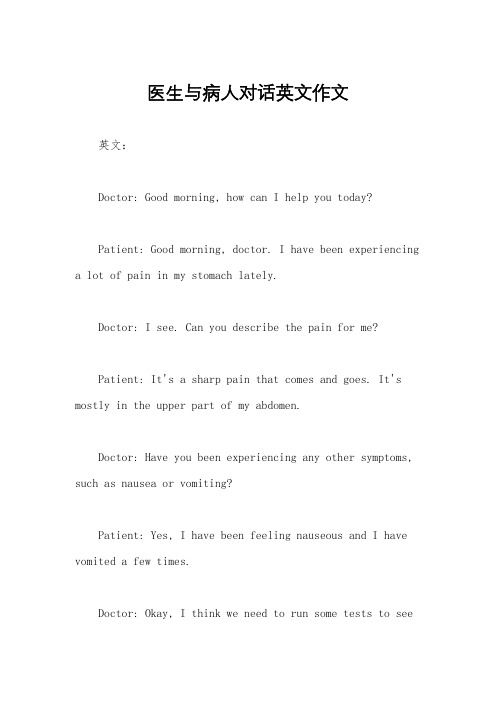
医生与病人对话英文作文英文:Doctor: Good morning, how can I help you today?Patient: Good morning, doctor. I have been experiencing a lot of pain in my stomach lately.Doctor: I see. Can you describe the pain for me?Patient: It's a sharp pain that comes and goes. It's mostly in the upper part of my abdomen.Doctor: Have you been experiencing any other symptoms, such as nausea or vomiting?Patient: Yes, I have been feeling nauseous and I have vomited a few times.Doctor: Okay, I think we need to run some tests to seewhat's going on. We'll start with a blood test and an ultrasound.Patient: Okay, sounds good.中文:医生,早上好,有什么可以帮您的吗?病人,早上好,医生。
最近我的胃一直很痛。
医生,我明白了。
您能描述一下这种疼痛的感觉吗?病人,是一种尖锐的疼痛,会时不时地出现。
主要在我的上腹部。
医生,您还有其他的症状吗?比如恶心或呕吐?病人,是的,我一直感到恶心,也呕吐了几次。
医生,好的,我觉得我们需要进行一些检测,看看到底出了什么问题。
我们会先进行血液检测和超声检查。
病人,好的,听起来不错。
伊索寓言医生和病人读后感
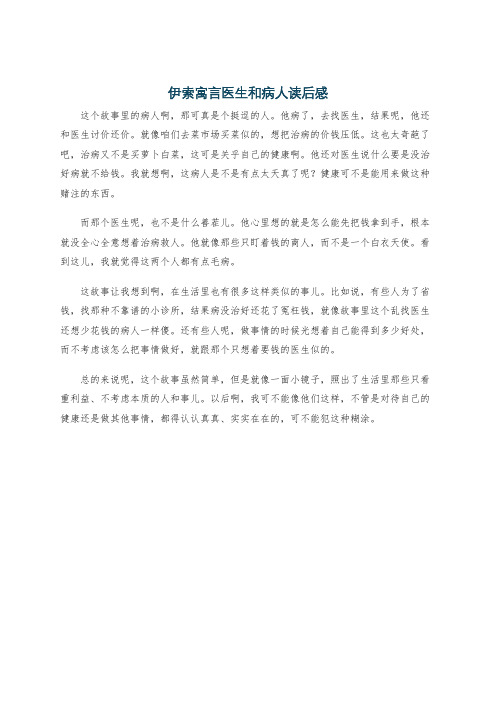
伊索寓言医生和病人读后感
这个故事里的病人啊,那可真是个挺逗的人。
他病了,去找医生,结果呢,他还和医生讨价还价。
就像咱们去菜市场买菜似的,想把治病的价钱压低。
这也太奇葩了吧,治病又不是买萝卜白菜,这可是关乎自己的健康啊。
他还对医生说什么要是没治好病就不给钱。
我就想啊,这病人是不是有点太天真了呢?健康可不是能用来做这种赌注的东西。
而那个医生呢,也不是什么善茬儿。
他心里想的就是怎么能先把钱拿到手,根本就没全心全意想着治病救人。
他就像那些只盯着钱的商人,而不是一个白衣天使。
看到这儿,我就觉得这两个人都有点毛病。
这故事让我想到啊,在生活里也有很多这样类似的事儿。
比如说,有些人为了省钱,找那种不靠谱的小诊所,结果病没治好还花了冤枉钱,就像故事里这个乱找医生还想少花钱的病人一样傻。
还有些人呢,做事情的时候光想着自己能得到多少好处,而不考虑该怎么把事情做好,就跟那个只想着要钱的医生似的。
总的来说呢,这个故事虽然简单,但是就像一面小镜子,照出了生活里那些只看重利益、不考虑本质的人和事儿。
以后啊,我可不能像他们这样,不管是对待自己的健康还是做其他事情,都得认认真真、实实在在的,可不能犯这种糊涂。
医生和病人的作文

医生和病人的作文
哎呀呀,今天我跟着妈妈来到了医院。
一进医院,我就看到好多病人呀,嘿呀,他们有的看起来很难受的样子。
我们来到了一个科室,里面有个医生叔叔正在给一位病人看病呢。
医生叔叔戴着眼镜,看起来好严肃呀,嘿嘿。
那个病人一直在和医生叔叔说自己哪里不舒服,哎呀,医生叔叔很认真地听着,还不时地在本子上记着什么。
然后医生叔叔开始给病人检查身体啦,一会儿听听这儿,一会儿摸摸那儿。
病人有点紧张,医生叔叔就笑着说:“别担心,放松点。
”哈哈。
检查完后,医生叔叔对病人说:“没啥大问题,吃点药就好啦。
”病人一听,脸上马上露出了笑容,说:“哎呀,太好了,谢谢医生。
”
我看着医生叔叔,心里想,医生可真厉害呀,能帮病人解决痛苦呢。
嘿呀,我长大了也想当医生,帮助更多的人。
嘿嘿,今天在医院里可真
是让我学到了不少东西呀!哈哈。
伊索寓言医生和病人读后感
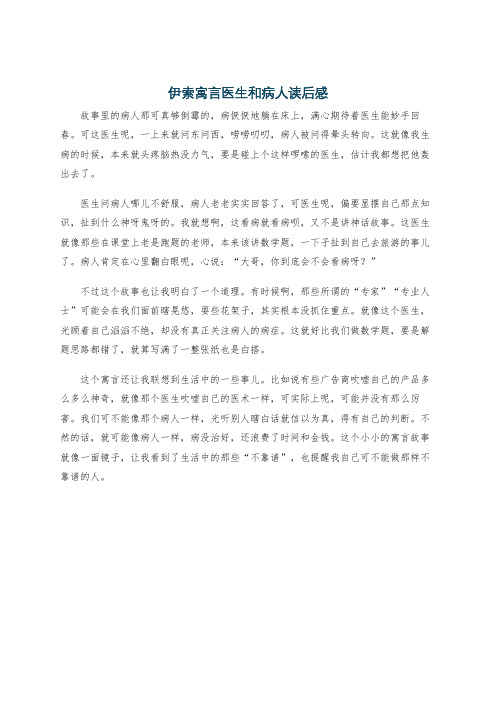
伊索寓言医生和病人读后感
故事里的病人那可真够倒霉的,病恹恹地躺在床上,满心期待着医生能妙手回春。
可这医生呢,一上来就问东问西,唠唠叨叨,病人被问得晕头转向。
这就像我生病的时候,本来就头疼脑热没力气,要是碰上个这样啰嗦的医生,估计我都想把他轰出去了。
医生问病人哪儿不舒服,病人老老实实回答了,可医生呢,偏要显摆自己那点知识,扯到什么神呀鬼呀的。
我就想啊,这看病就看病呗,又不是讲神话故事。
这医生就像那些在课堂上老是跑题的老师,本来该讲数学题,一下子扯到自己去旅游的事儿了。
病人肯定在心里翻白眼呢,心说:“大哥,你到底会不会看病呀?”
不过这个故事也让我明白了一个道理。
有时候啊,那些所谓的“专家”“专业人士”可能会在我们面前瞎晃悠,耍些花架子,其实根本没抓住重点。
就像这个医生,光顾着自己滔滔不绝,却没有真正关注病人的病症。
这就好比我们做数学题,要是解题思路都错了,就算写满了一整张纸也是白搭。
这个寓言还让我联想到生活中的一些事儿。
比如说有些广告商吹嘘自己的产品多么多么神奇,就像那个医生吹嘘自己的医术一样,可实际上呢,可能并没有那么厉害。
我们可不能像那个病人一样,光听别人瞎白话就信以为真,得有自己的判断。
不然的话,就可能像病人一样,病没治好,还浪费了时间和金钱。
这个小小的寓言故事就像一面镜子,让我看到了生活中的那些“不靠谱”,也提醒我自己可不能做那样不靠谱的人。
病人与医生_作文150字_小学三年级童话寓言作文_

病人与医生
有个人生了病,医生问他怎么样,他说出汗过多。。医生说:“这也很好。”第三次医生再来问他的病情时,他说现在泻肚子。医生说:“这仍很好。”病人有一个亲戚来看他,问他怎么样,他说:“我就因这些很好而快丧命了。”
这故事是说,只讲好话的人会给人们带来危险。
我和患者的故事观后感作文
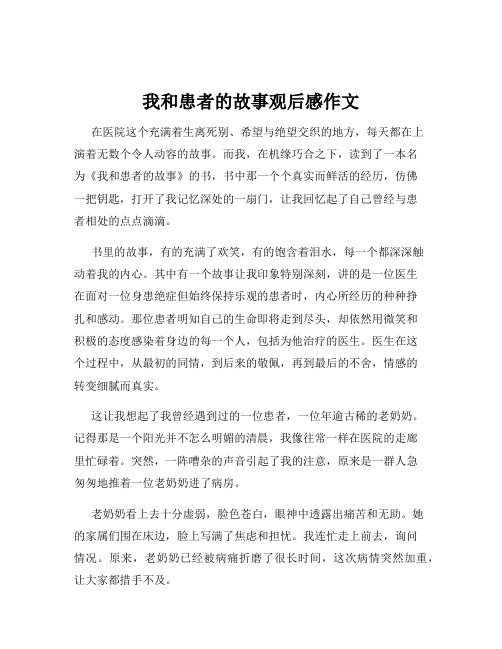
我和患者的故事观后感作文在医院这个充满着生离死别、希望与绝望交织的地方,每天都在上演着无数个令人动容的故事。
而我,在机缘巧合之下,读到了一本名为《我和患者的故事》的书,书中那一个个真实而鲜活的经历,仿佛一把钥匙,打开了我记忆深处的一扇门,让我回忆起了自己曾经与患者相处的点点滴滴。
书里的故事,有的充满了欢笑,有的饱含着泪水,每一个都深深触动着我的内心。
其中有一个故事让我印象特别深刻,讲的是一位医生在面对一位身患绝症但始终保持乐观的患者时,内心所经历的种种挣扎和感动。
那位患者明知自己的生命即将走到尽头,却依然用微笑和积极的态度感染着身边的每一个人,包括为他治疗的医生。
医生在这个过程中,从最初的同情,到后来的敬佩,再到最后的不舍,情感的转变细腻而真实。
这让我想起了我曾经遇到过的一位患者,一位年逾古稀的老奶奶。
记得那是一个阳光并不怎么明媚的清晨,我像往常一样在医院的走廊里忙碌着。
突然,一阵嘈杂的声音引起了我的注意,原来是一群人急匆匆地推着一位老奶奶进了病房。
老奶奶看上去十分虚弱,脸色苍白,眼神中透露出痛苦和无助。
她的家属们围在床边,脸上写满了焦虑和担忧。
我连忙走上前去,询问情况。
原来,老奶奶已经被病痛折磨了很长时间,这次病情突然加重,让大家都措手不及。
在接下来的日子里,我负责照顾老奶奶的日常起居。
一开始,老奶奶对我总是有些冷漠,不太愿意和我交流。
我知道,她是被病痛折磨得没了心情。
但我并没有放弃,每次给她换药、量体温的时候,都会和她说上几句贴心的话,哪怕她只是简单地应一声,我也觉得是一种进步。
慢慢地,老奶奶对我的态度开始有了转变。
有一天,我像往常一样给她送药,她突然拉住了我的手,对我说:“闺女啊,谢谢你这段时间的照顾,我这把老骨头给你们添麻烦了。
”那一刻,我看到她的眼里闪烁着泪花,我的心也跟着揪了起来。
为了让老奶奶能更快地好起来,我想尽了各种办法。
每天都会给她讲一些有趣的事情,逗她开心;帮她调整饮食,让她能吃得更营养;还会在她身体允许的情况下,扶着她在病房里走一走,活动活动筋骨。
读《医生与病人》有感_读后感
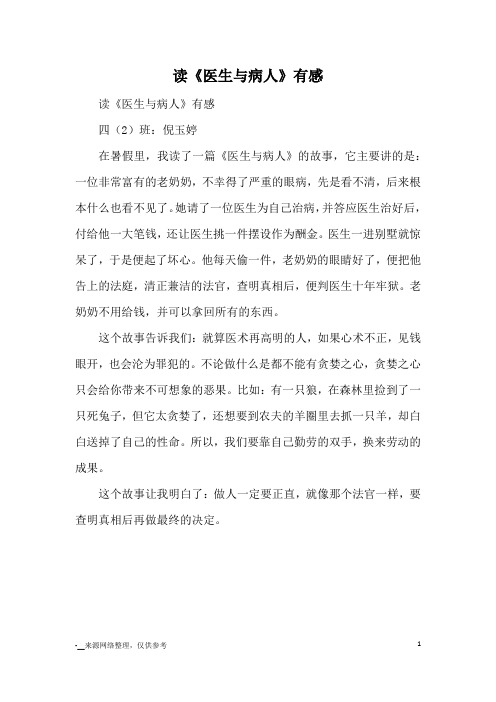
读《医生与病人》有感
读《医生与病人》有感
四(2)班:倪玉婷
在暑假里,我读了一篇《医生与病人》的故事,它主要讲的是:一位非常富有的老奶奶,不幸得了严重的眼病,先是看不清,后来根本什么也看不见了。
她请了一位医生为自己治病,并答应医生治好后,付给他一大笔钱,还让医生挑一件摆设作为酬金。
医生一进别墅就惊呆了,于是便起了坏心。
他每天偷一件,老奶奶的眼睛好了,便把他告上的法庭,清正兼洁的法官,查明真相后,便判医生十年牢狱。
老奶奶不用给钱,并可以拿回所有的东西。
这个故事告诉我们:就算医术再高明的人,如果心术不正,见钱眼开,也会沦为罪犯的。
不论做什么是都不能有贪婪之心,贪婪之心只会给你带来不可想象的恶果。
比如:有一只狼,在森林里捡到了一只死兔子,但它太贪婪了,还想要到农夫的羊圈里去抓一只羊,却白白送掉了自己的性命。
所以,我们要靠自己勤劳的双手,换来劳动的成果。
这个故事让我明白了:做人一定要正直,就像那个法官一样,要查明真相后再做最终的决定。
-__来源网络整理,仅供参考 1。
医生与病人作文

七、作文(70分) 19.根据以下材料,选取角度,自 拟题目,写一篇不少于800字的文章,文体不限,诗 歌除外。
医生到重症病房查房,来到一个垂危的病 人床前,对病人说:“我们也不再隐瞒你了, 对于你的病我们也没有什么好办法了,我们 已经通知你的家人准备后事。你还有什么要 求吗?”病人挣扎着,用大家几乎听不到的 声音说:“再换一家医院,换一个医生!”
▪ 脱开材料光写“希望”,准确地说,应为绝境中, 困境中的“希望”; 还有同学把几乎不相干的材 料生硬地进行粘贴,泛文化现象尤为严重,例如: 谈中国的城镇化建设。。不管议论文还是记叙文, 读来都感觉与原材料风马牛不相及。
▪ 二、文体选择: ▪ ⑴学生大多采用议论文体,大多数议论文立意准确,观点明确,
▪ 最后呼吁人们“最重要的是把握生命中当下的 快乐”。
▪ 总体来说,本文开笔引入巧妙,行文思路清晰,论 说层次渐进,书写工整清晰,是一片不错的考场议 论文,但观点提出后的论说略显粗糙,论说素材还 可丰富,综合评定为二类卷,给分59。
▪ (正面)不轻易地放弃希望;(反面)要面对 现实,不做无谓的努力;要从自身找原因,不 要怀疑他人。
▪ 解读补充:从病人角度,坦然面对生死也很切合题意。
▪ 1.《顺应天命》
2.《贵在有自知之明》
▪ 3.《莫强求、且从容》 4.《面对定局 坦然待之》。
▪ 5. 《何必抱香枝头》 6. 《谁说绝处不逢生》
读书多的同学不一定得分高。不一定得分高的一 般有两个原因,一是审题出现了偏差,二是读来 的书不会用。在论证技巧、语言方面有所欠缺。 审题定生死,语言分高下。
- 1、下载文档前请自行甄别文档内容的完整性,平台不提供额外的编辑、内容补充、找答案等附加服务。
- 2、"仅部分预览"的文档,不可在线预览部分如存在完整性等问题,可反馈申请退款(可完整预览的文档不适用该条件!)。
- 3、如文档侵犯您的权益,请联系客服反馈,我们会尽快为您处理(人工客服工作时间:9:00-18:30)。
作文:读《医生与病人》有感
读《医生与病人》有感 四(2)班:倪玉婷 在暑假里,我读了一篇《医生与病人》 的故事,它主要讲的是:一位非常富有的老奶奶,不幸得了严重的眼病,先是看不清,后来根本什么也看不见了。她请了一位医生为自己治病,并答应医生治好后,付给他一大笔钱,还让医生挑一件摆设作为酬金。医生一进别墅就惊呆了,于是便起了坏心。他每天偷一件,老奶奶的眼睛好了,便把他告上的法庭,清正兼洁的法官,查明真相后,便判医生十年牢狱。老奶奶不用给钱,并可以拿回所有的东西。 这个故事告诉我们:就算医术再高明的人,如果心术不正,见钱眼开,也会沦为罪犯的。不论做什么是都不能有贪婪之心,贪婪之心只会给你带来不可想象的恶果。比如:有一只狼,在森林里捡到了一只死兔子,但它太贪婪了,还想要到农夫的羊圈里去抓一只羊,却白白送掉了自己的性命。所以,我们要靠自己勤劳的双手,换来劳动的成果。 这个故事让我明白了:做人一定要正直,就像那个法官一样,要查明真相后再做最终的决定。
